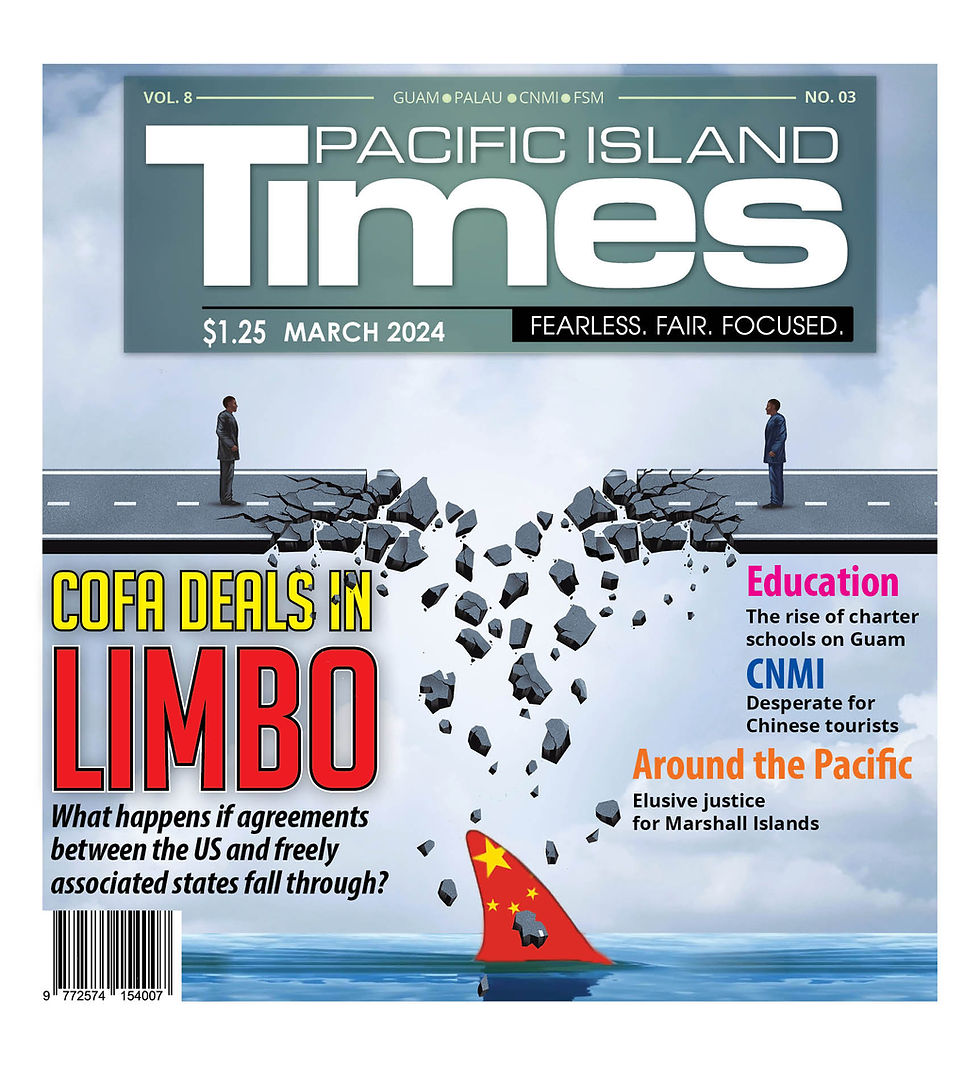
By Bryan Manabat
Saipan— With China’s outbound travel beginning to crest at a vigorous rate, the CNMI’s tourism stakeholders are desperate to draw more visitors from the Asian country. But amid the CNMI’s struggle to resuscitate its visitor industry, the China market is increasingly becoming a contentious issue. Gov. Arnold Palacios is adamant about pivoting away from Chinese tourism but the local business community maintains that this market would allow the industry to pull through.
Palacios has not responded to the lawmakers and the business sector’s call to support the CNMI Economic Vitality & Security Travel Authorization Program or EVS-TAP and the utilization of the Annex VI provision of the U.S.-China Air Transport Agreement of July 9, 2007.
The bicameral CNMI legislature has unanimously expressed their support for the implementation of EVS-TAP noting the potential economic benefit to the CNMI economy. The Saipan Chamber of Commerce has called on its members to start a letter-writing campaign in support of EVS-TAP and the utilization of the Annex VI provision.
However, Palacios reiterated his stance to tap the military and sought more Navy ships to visit CNMI ports, seeking to minimize the industry’s overreliance on Chinese tourists, citing the geopolitical reality between Washington and Beijing.
Last year, U.S. lawmakers sought the dissolution of the CNMI-only visa waivers for Chinese travelers, saying the program has opened the floodgates for all sorts of problems in the commonwealth, including drug trafficking, illegal immigration, organized crime and, possibly, espionage.
ADVERTISEMEN
The Department of Finance recently reported that it has missed its revenue target for the first quarter of fiscal year 2024. Finance announced that it fell short of its $43.7 million revenue target and has collected only $38.1 million.
Before the Covid-19 pandemic, Chinese visitors accounted for 41 percent of total arrivals in the CNMI. In 2019, arrivals from China totaled more than 180,000. In 2020, it dropped to 18,550, and below 200 in 2021 and 2022 resulting from China’s suspension of its approved destination status agreements with Chinese tourists’ destinations.
In August 2023, the China National Tourism Administration reinstated the approved destination status agreements with some countries, including the United States, a policy decision that extends to the CNMI.
The Department of Homeland Security recently approved the interim final ruling establishing the EVS-TAP for travelers from China. EVS-TAP will allow pre-screened Chinese nationals to travel to the CNMI visa-free for up to 14 days, replacing the previous paper-based discretionary parole program. Chinese visitors must fill out an electronic version of Form I-736 under EVS-TAP and submit it online to Customs and Border Protection at least five days in advance of their arrival to the CNMI.
ADVERTISEMENT
At the height of the Covid-19 pandemic in 2020, the Commonwealth Ports Authority requested the Department of Transportation to exempt the CNMI from its order limiting the number of round-trip flight services between the U.S. and China. CPA asked DOT to reinstate Annex VI of the U.S.-China Civil Air Transport Agreement, which exempts the CNMI from flight frequency limitations between the U.S. and China.
"Annex VI exempts us from the frequency limitation. The current DOT order makes it unclear if Annex VI still applies," said former CPA chairwoman Kimberly King-Hinds. "We want DOT to affirm that Annex VI still applies, which would not subject flights from China to CNMI to the frequency limitation. We've made the argument but Gov. Palacios' public statements about the pivot away from China have injured the application. We requested a support letter from him but he did not do so."
According to the former CPA official, DOT issued an order stating that China was not being fair to U.S. air carriers and suspended all Chinese scheduled air services between the U.S. and China. "That order has been modified but is not clear as to whether or not the CNMI is exempted and Annex VI still applies. If it applies, it means that we are subject to the limitations and lumped in with travel to the U.S.," King-Hinds said. "If there was a choice between flying to the U.S. and the CNMI, Chinese carriers would not come to the CNMI."
Despite China’s move to lift the ban on group tours to the Northern Marianas, the commonwealth’s previously largest market has remained rather slack. According to the Marianas Visitors Authority, Chinese tourists accounted for only 2 percent of the total number of arrivals in November.
The MVA, however, has not expressed any inclination to drum up the China market. Instead, the MVA is bent on looking elsewhere to fill the void. The dismal recovery of the China market, according to the MVA, underscored “the need to further expand the Marianas’ source market mix to increase arrival numbers and revenue generation.”
The EV-TAP program, which takes effect on Sept. 30, is part of a transition plan leading to the eventual termination of the visa waiver program for the China market. Once it is fully implemented,” DHS said in the final rule posted on the Federal Register, “the current parole policy for (Chinese) nationals seeking to enter the CNMI will be discontinued.”




Comments